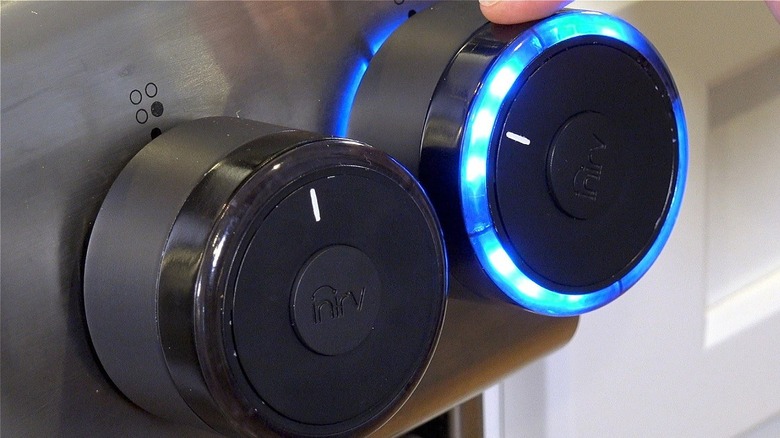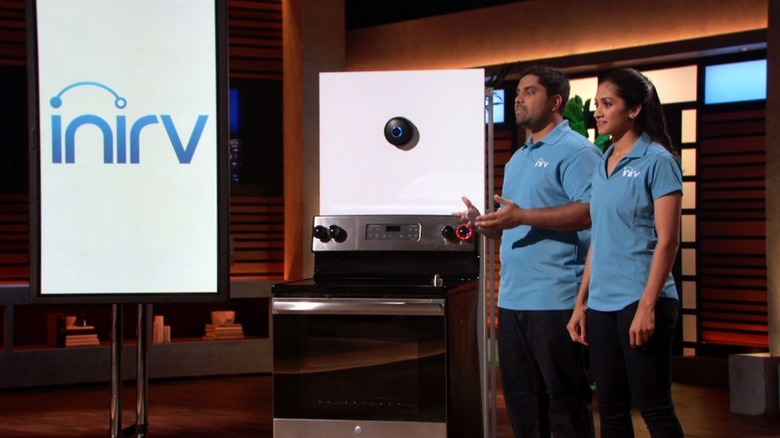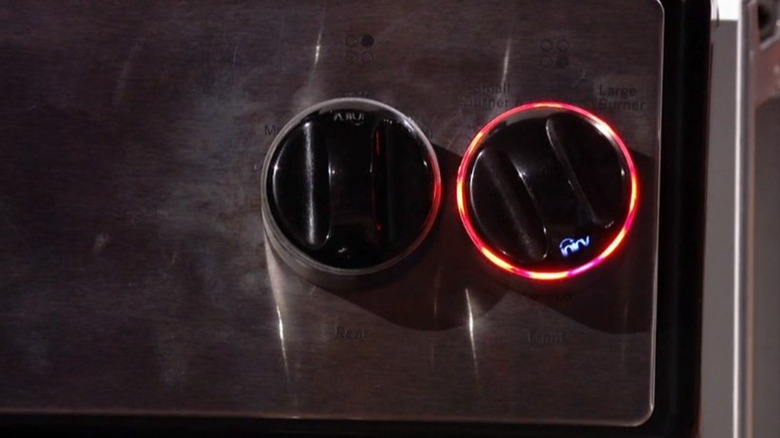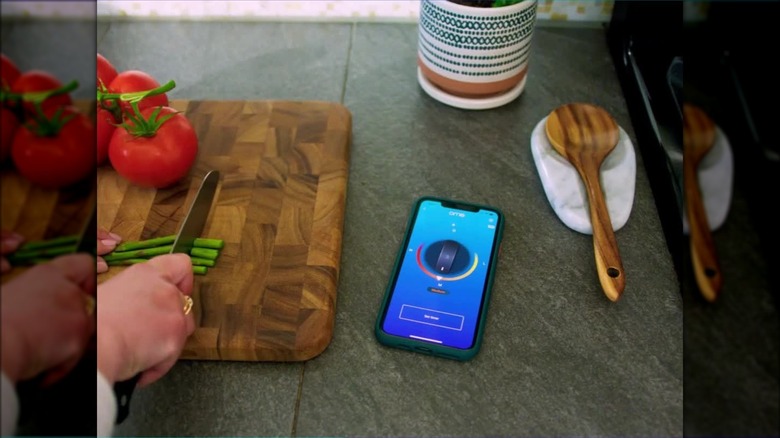What Happened To Inirv After Shark Tank?
When Akshita Iyer heard her mother had caused a house fire after accidentally leaving the stove on, she was determined to prevent it from happening again. "Why isn't there a product that makes the stove smart, and why isn't there something we can retrofit over the stove we already have?" Iyer asked when pitching Inirv, a remote stove shutdown device, on a January 7, 2018, episode of "Shark Tank. She explained that she turned to her husband, Ranjith Babu, for help with a solution. "I can't imagine starting this with anybody else," she told the Chattanooga Times Free Press. "We have complementary skills, and because we started together, we've been able to make so much more progress without needing to raise a lot of money."
Iyer and Babu launched Inirv on Kickstarter on January 4, 2017, describing it as "the first device that lets you control your stove from your smartphone and helps to protect you and your loved ones from the devastating effects of house fires." The device uses a combination of smoke, gas, and motion detectors. Iyer and Babu pitched their product to the Sharks while it was still a prototype. The pair had raised $175,000 on Kickstarter and $183,000 on Indigogo to fund the endeavor and were hopeful the Sharks would see the value of their device.
The Sharks weren't willing to take a gamble on Inirv
The Sharks appeared very subdued during Akshita Iyer and Ranjith Babu's pitch for Inirv, most likely because of the couple's request of $800,000 for 8% equity before even explaining the product. After hearing their pitch, Robert Herjavec asked them where they were in the development stage. Iyer and Babu explained that they had a working prototype they were finetuning.
That they had not sold any of the sensors and were already evaluating the product at $10 million was off-putting to several of the Sharks. Mark Cuban was the first to drop out because he didn't think many people would pay $250 for four sensors to keep their home from burning down. Kevin O'Leary and Daymond John didn't believe they would ever get their money back. Herjavec made an offer of $800,000 for 20%, but when they countered, he stepped away from the table.
Finally, Lori Greiner, who loved the product, refused to invest almost $1 million on a prototype. Ultimately, Iyer and Babu left "Shark Tank" without a deal.
After Shark Tank, things went south for Inirv
Less than six months after the episode aired, Akshita Iyer and Ranjith Babu ran into legal trouble when their manufacturer, Enventys, sued, claiming it had not been paid. The Inirv co-founders countersued, claiming they had received an unfinished prototype and were, therefore, unsuccessful in securing funding on "Shark Tank." A settlement was eventually reached in December 2018.
Legal action was just the beginning of the trouble Iyer and Babu faced. Difficulty making the knobs came with trouble shipping them to those who helped with their crowdfunding campaign. "Also, no updates. I would like my money back. This has been a years-long process, and you have taken a lot of money without producing a product. Please give me my money back," wrote one upset backer on the Inirv Kickstarter comments page. Another wondered, "Does anyone know how we can report this project? They have taken a lot of people's money and not sent them a product or offered a refund. I signed up for this in 2016. [Six] years later, I still have nothing."
The last update on the company's Kickstarter page was on June 28, 2021, stating that by summer 2021, all remaining orders would be fulfilled. However, several comments still show that many people are still seeking refunds as recently as August 22, 2023.
Inirv became Ome
On June 14, 2021, Akshita Iyer announced on LinkedIn that Inirv had rebranded as Ome, and the products were available for order. As of this writing, one knob will cost $149.99, while a four-pack will set shoppers back $449.99. Unfortunately, Ome's product only works with stoves with knobs, not buttons. In addition to selling the smart stove knobs, Ome also runs a blog featuring various recipes for dishes such as fondue, curry fettuccine, and peach preserves. The company has over 2,000 Instagram followers and a variety of posts, including ones that show how to control the smart knobs with a smartphone.
In January of 2023, Iyer was interviewed by Harvest Growth and explained that looking back, she's glad they didn't take the deal with Robert Herjavec. "I didn't know enough about how to build a business to be able to effectively and efficiently use that capital," she said. "I think it would've gone down the drain." She also said that Ome started finding ways to get the product into the hands of older adults, which is what she envisioned when she first conceived the product. "There's an opportunity to give that same peace of mind to senior living communities," she said. "From a business perspective, it just gets us to scale faster because we can get larger purchase orders. We can get larger amounts of product into homes just going [business-to-business]."
Akshita Iyer is hopeful for Ome's future
While smart knobs are Ome's only product, Akshita Iyer says the company is always trying to update and streamline them. In a Founder to Founder episode of the Frontier podcast, Iyer said that Ome is moving from a Gen One to a Gen Two model this year after learning a lot from their mistakes. "We've got a Gen Two that's smaller that has more design flexibility, so we can match the brand style and aesthetic of your range and also is a lot easier to manufacture," Iyer said.
She's trying to find more cost-effective ways to get the product into more people's homes, such as working towards building partnerships with appliance manufacturers or home security companies. Iyer would also love to see Ome in the hands of a company with the money and resources to turn it into something bigger than it is.
Iyer has high hopes for Ome, and her dream is for the company to either be acquired or collaborate with an innovative business or corporation that can take Ome further. "Now that I say this out loud, I think one of my biggest criteria is, is this going to a company and a culture where someone, whether it's me or someone else, is actually gonna push this forward?"




